First held in 2004, the annual Beijing Forum aims to encourage mutual learning and facilitate meaningful exchanges across civilizations. It is jointly organized by Peking University (PKU), the Beijing Municipal Education Commission, and the Chey Institute for Advanced Studies.
Peking University, November 4, 2024: The 21st iteration of the Beijing Forum commenced at the Diaoyutai State Guesthouse on November 1, 2024, with its overarching theme of The Harmony of Civilizations and Prosperity of All and this year’s focus on The Era of Innovation and Advancement of Mankind. Thought leaders and scholars from around the world convened to share their insights and expertise on pressing global issues and unprecedented changes brought on by the innovation era.
Yin Li, Member of the Political Bureau of the CPC Central Committee, Secretary of the CPC Beijing Municipal Committee, received the Chinese and international guests and scholars attending the opening ceremony. Zhao Lei, Member of the Standing Committee and Secretary General of Beijing Municipal Committee Yu Yingjie, Member of the Standing Committee and Secretary of the Educational Work Committee of the CPC Beijing Municipal Committee, Ma Jun, Vice Mayor of Beijing, Hao Ping, Chairman of Peking University Council, and Gong Qihuang, President of PKU, also attended the meeting.
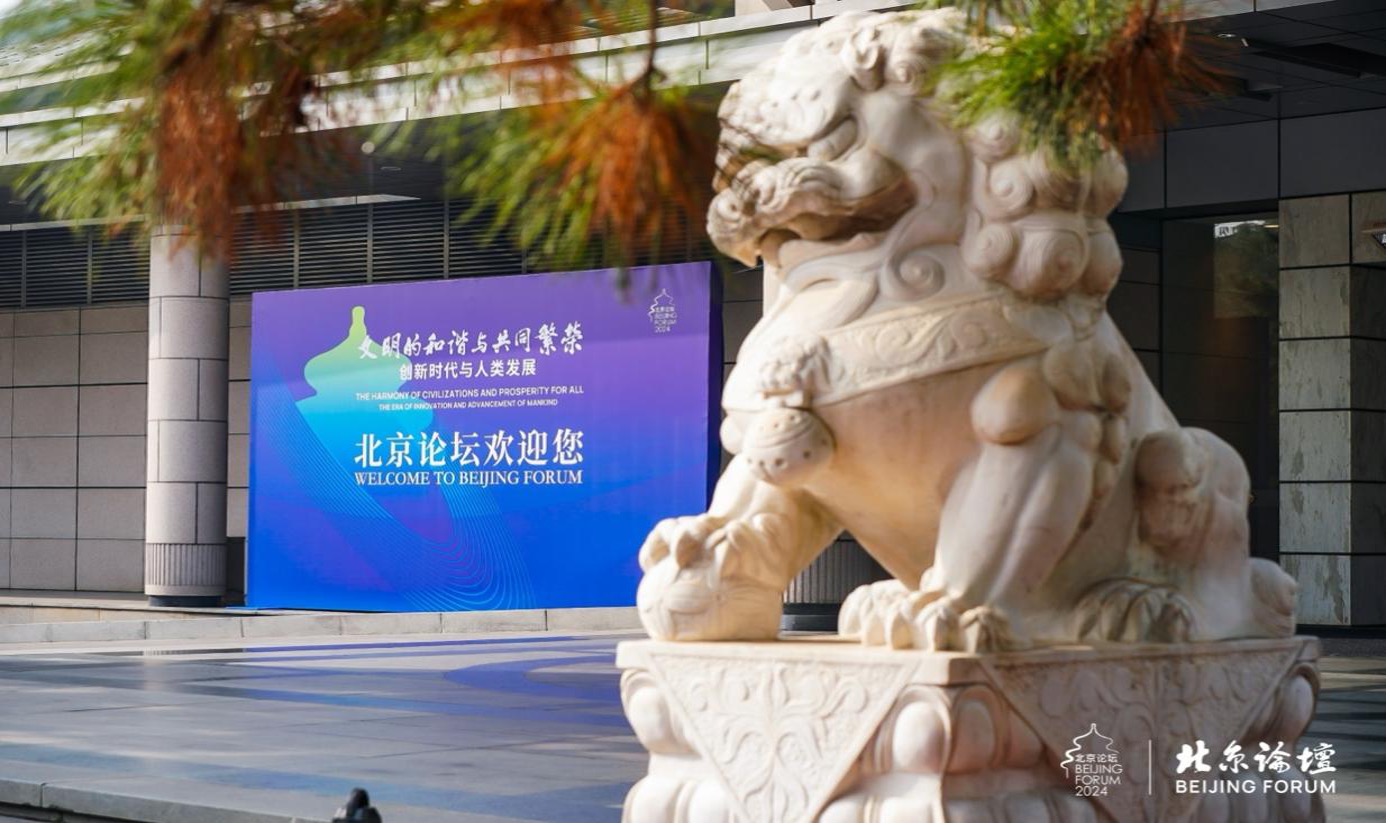
The opening ceremony was graced by prominent global figures, including former Prime Minister of Pakistan, Shahid Khagan Abbasi, former Prime Minister of Italy, Romano Prodi, 2018 Nobel Laureate in Physics and Chair Professor at PKU, Gérard Albert Mourou, Principal and Vice-Chancellor of University of Strathclyde, Jim McDonald GBE, President of Chey Institute for Advanced Studies, Kim Yoosuk, Founding President of Shenzhen Medical Academy of Research, Yan Nieng, SK Group Chairman Chey Tae-won, and Ambassadors to China from various countries.
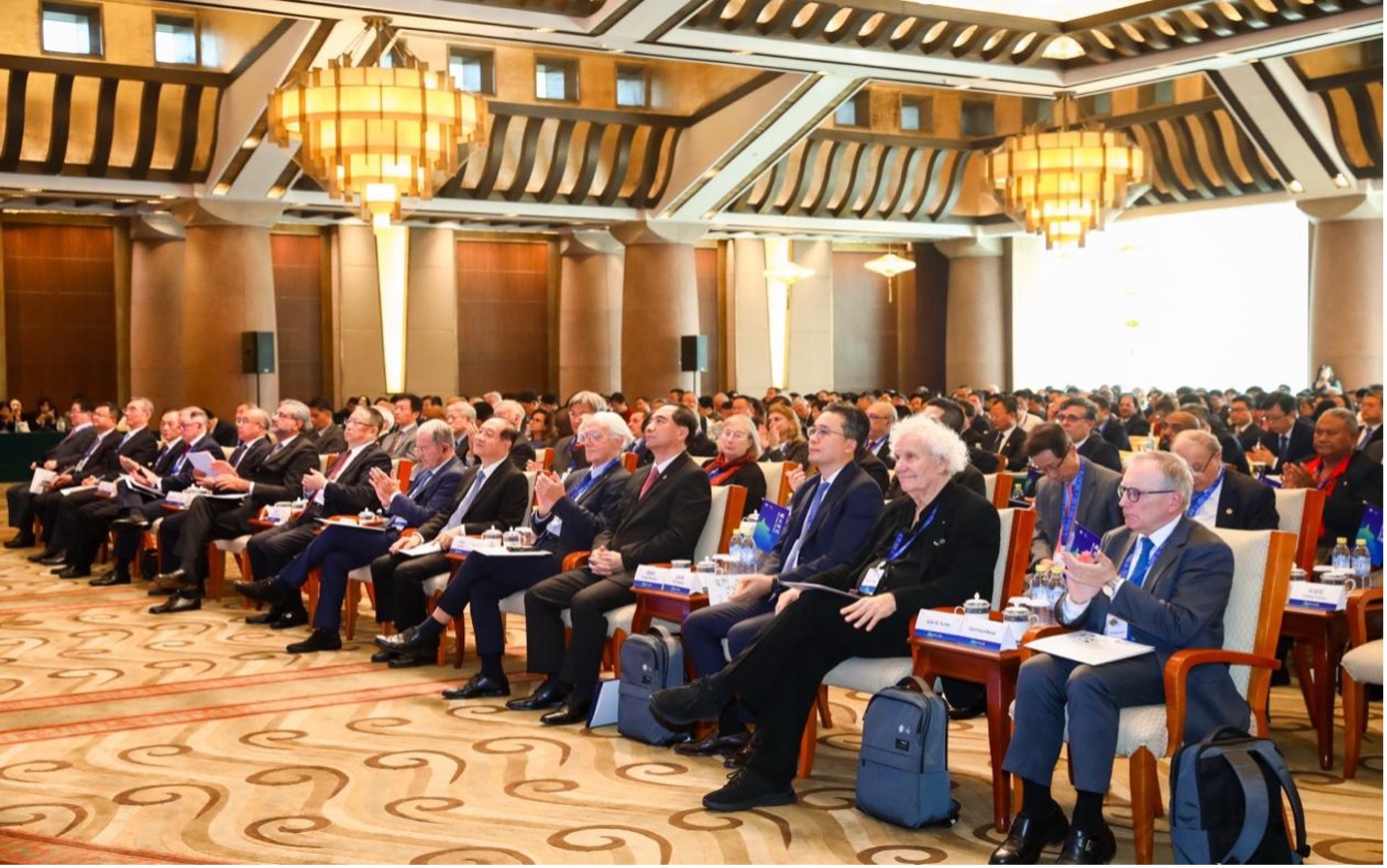
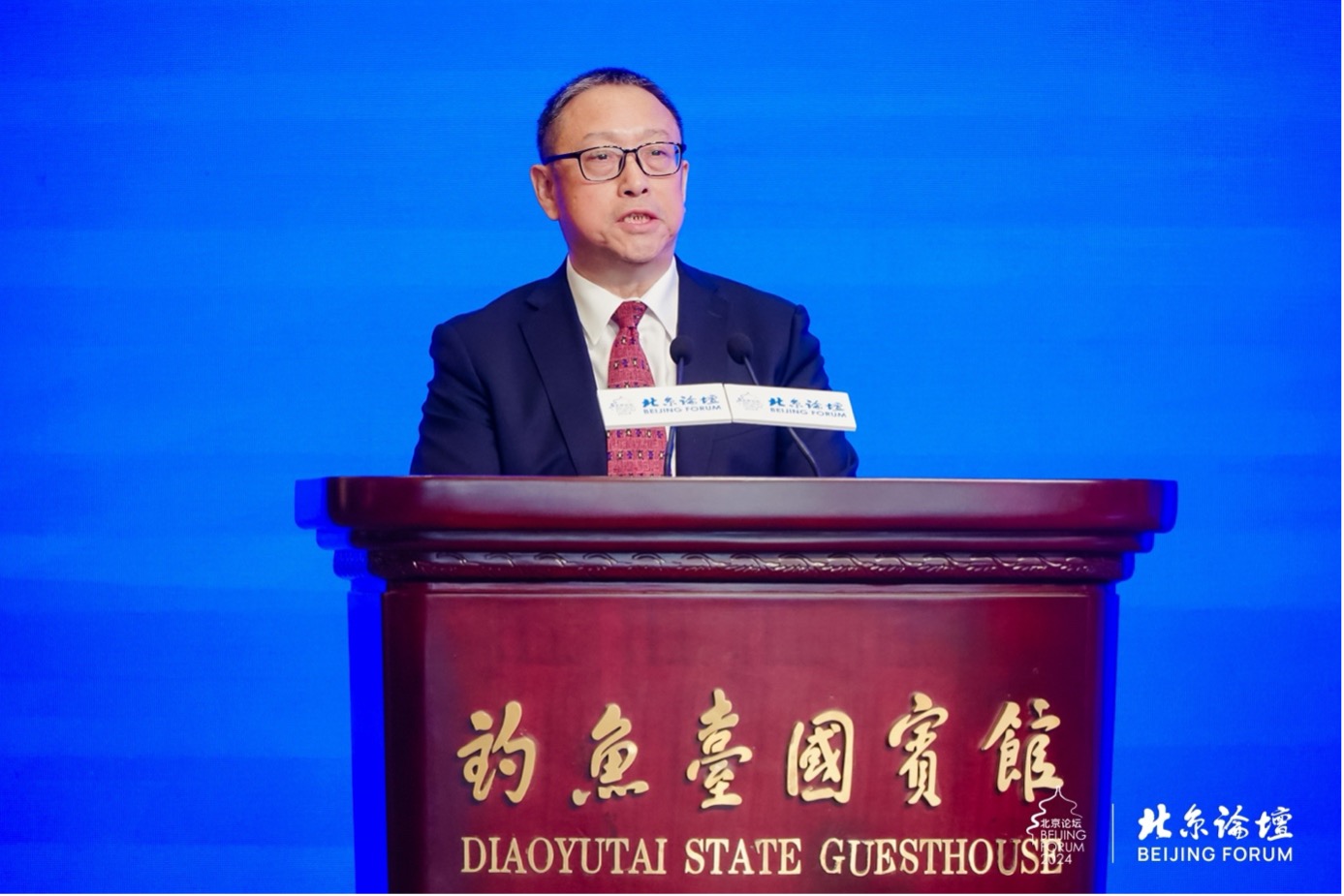
Zheng Jianbang, spoke on the importance of fostering an open and inclusive environment for innovation. He zeroed in on the need to leverage scientific and technological innovation to tackle global challenges. Zheng believes that cultural exchanges, collaboration in science and technology, and diverse ideologies, will ultimately bridge civilizations and promote harmony.
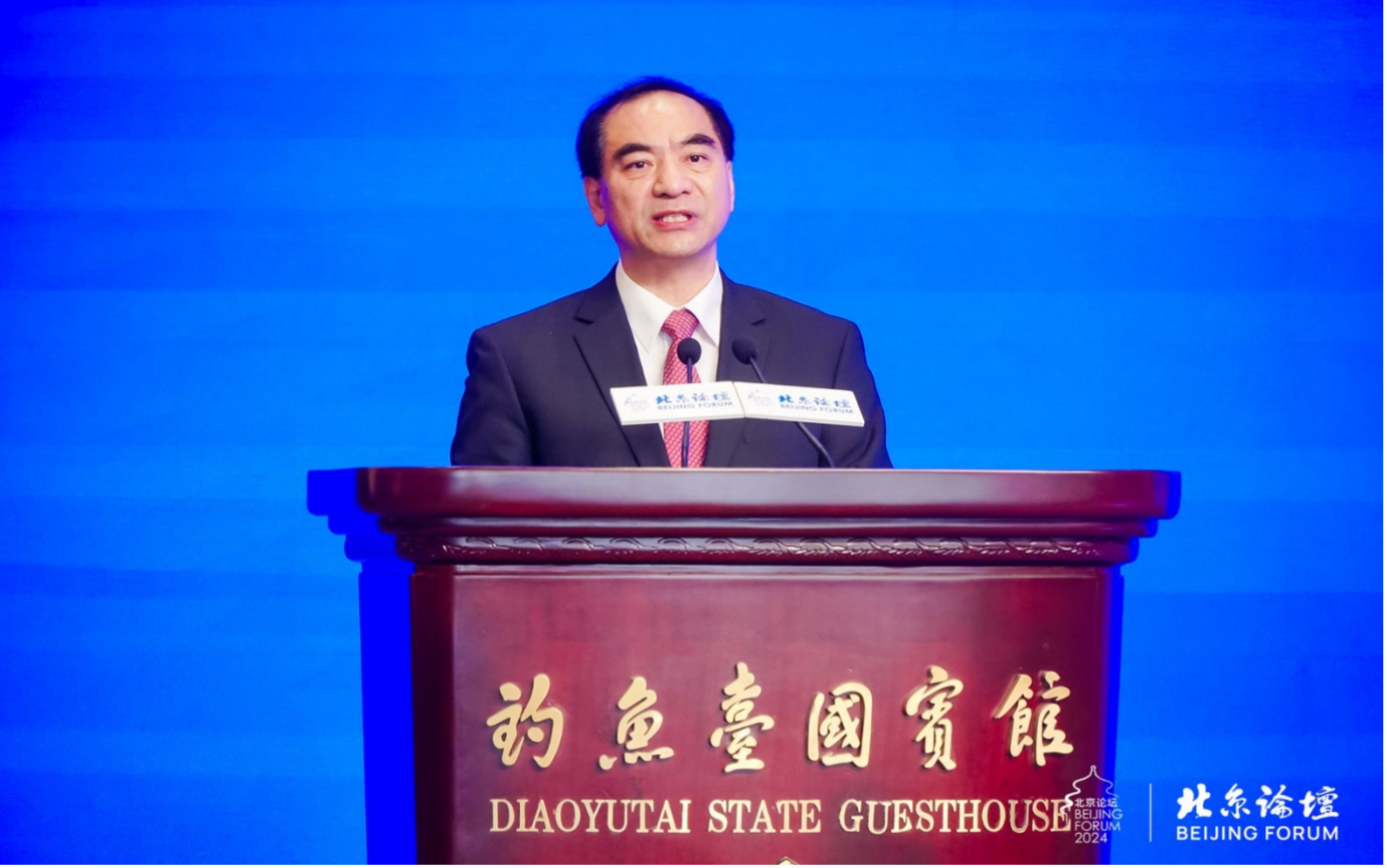
On behalf of Peking University, Gong Qihuang extended a warm welcome to all speakers and guests. He spoke about areas that institutions of higher education could work on to ensure positive outcomes of research and innovation in this era of innovation. Apart from promoting innovation and sustainability, President Gong also highlighted the importance of global exchanges of technology and culture in order to cultivate respect and understanding amongst students.
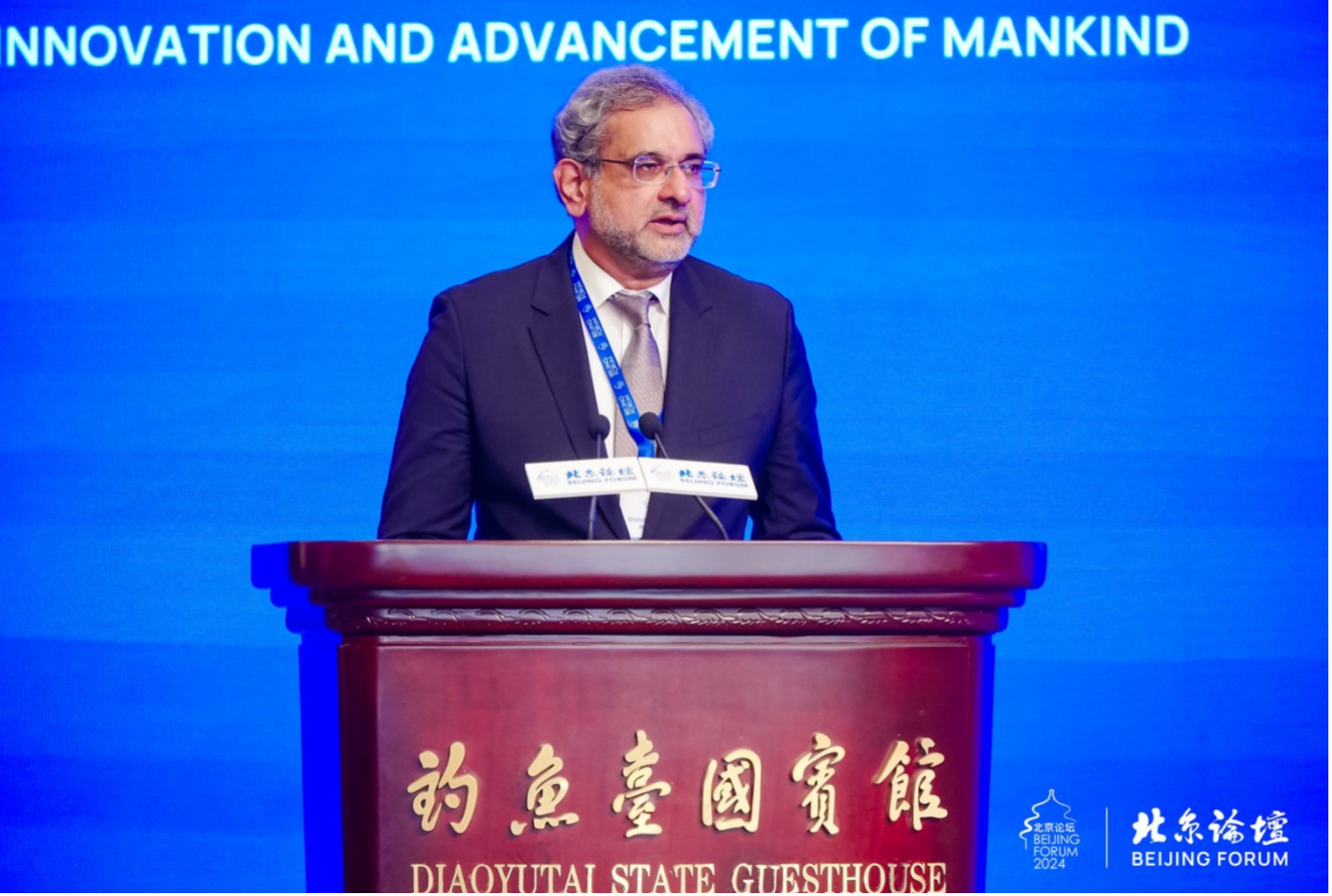
Shahid Khagan Abbasi highlighted the importance of inclusive and equitable growth, through addressing shared challenges and removal of global inequities. Abbasi also recognized the inherent disruptive nature of innovation, especially Artificial Intelligence: “We must prepare today not only for the potential of AI-driven transformation, but also develop the ethical principles guiding its future.”
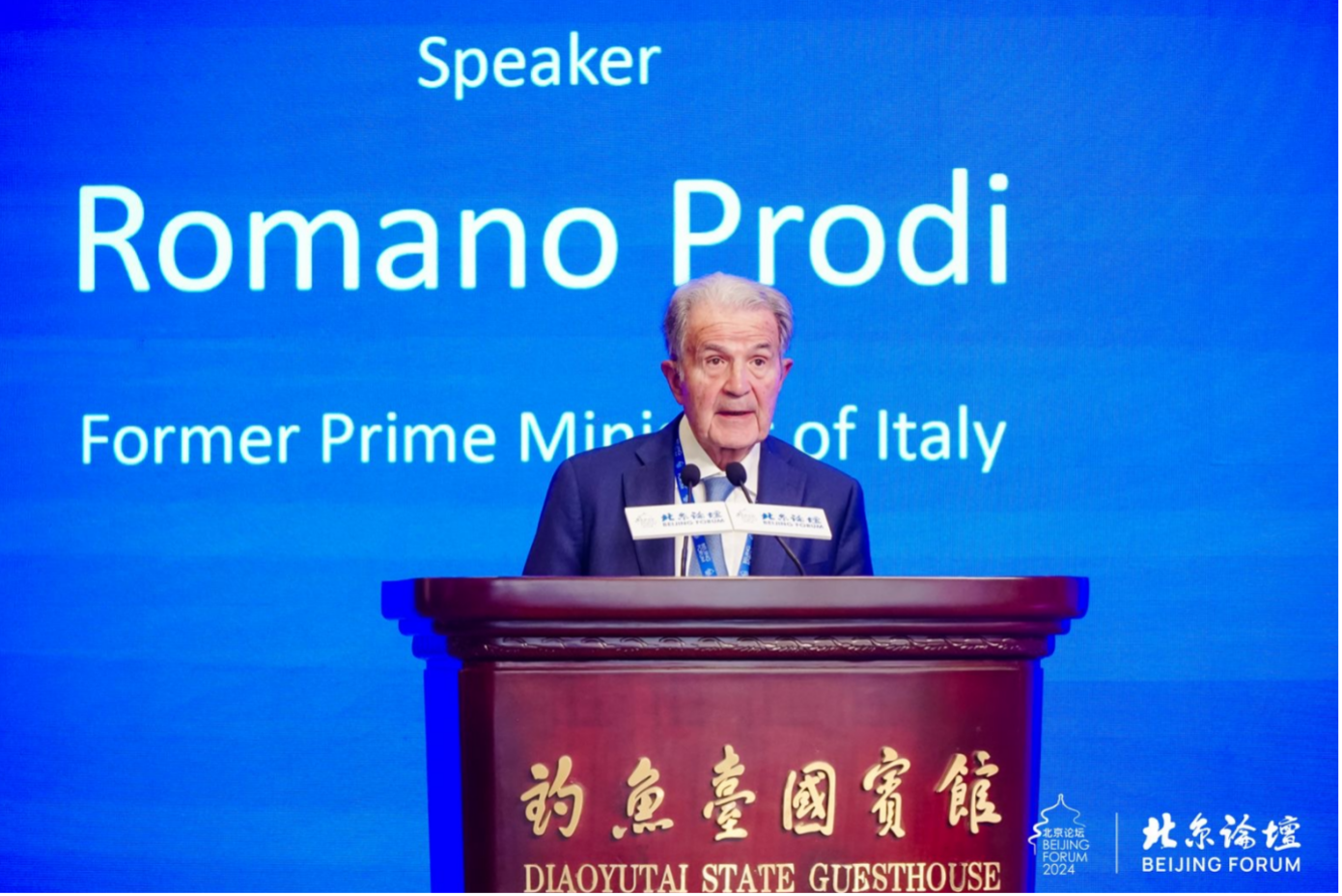
In his remarks, Romano Prodi highlighted the various challenges that mankind faces in this world of uncertainties, especially in terms of climate change and international relations.
Prodi believes that science has never been more divisive, and cooperation is the only way to preserve peace, especially in areas of research and technology. “With strong and increasing cooperation, (Europe) could enjoy generations of peace and prosperity.”
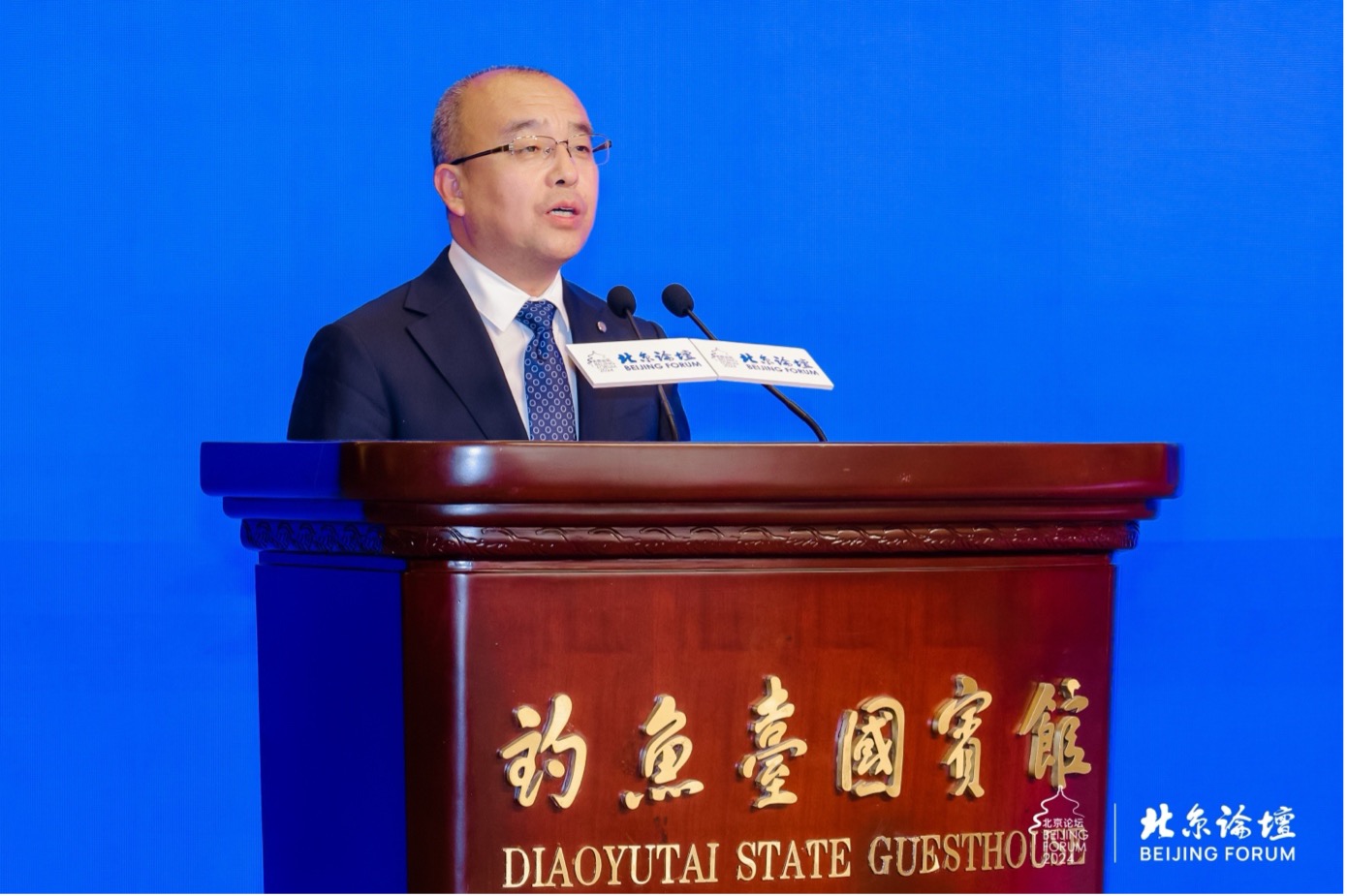
Yu Yingjie, called for collective efforts in addressing peace and development, enhancing innovation, and sharing opportunities to contribute positively to social progress and human welfare. Yu remarked, “The era is vibrant because of innovation, and civilization flourishes through exchange.”
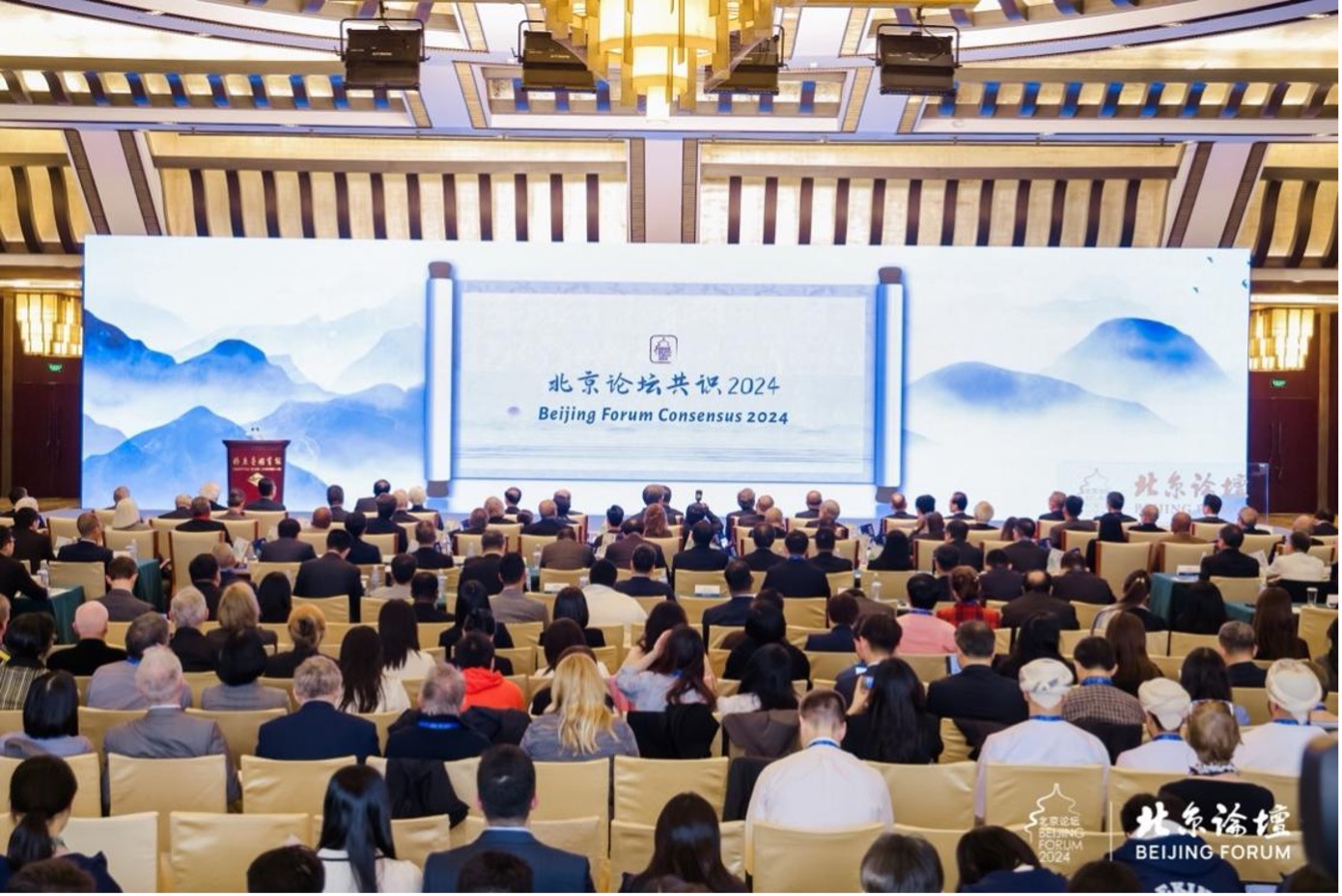
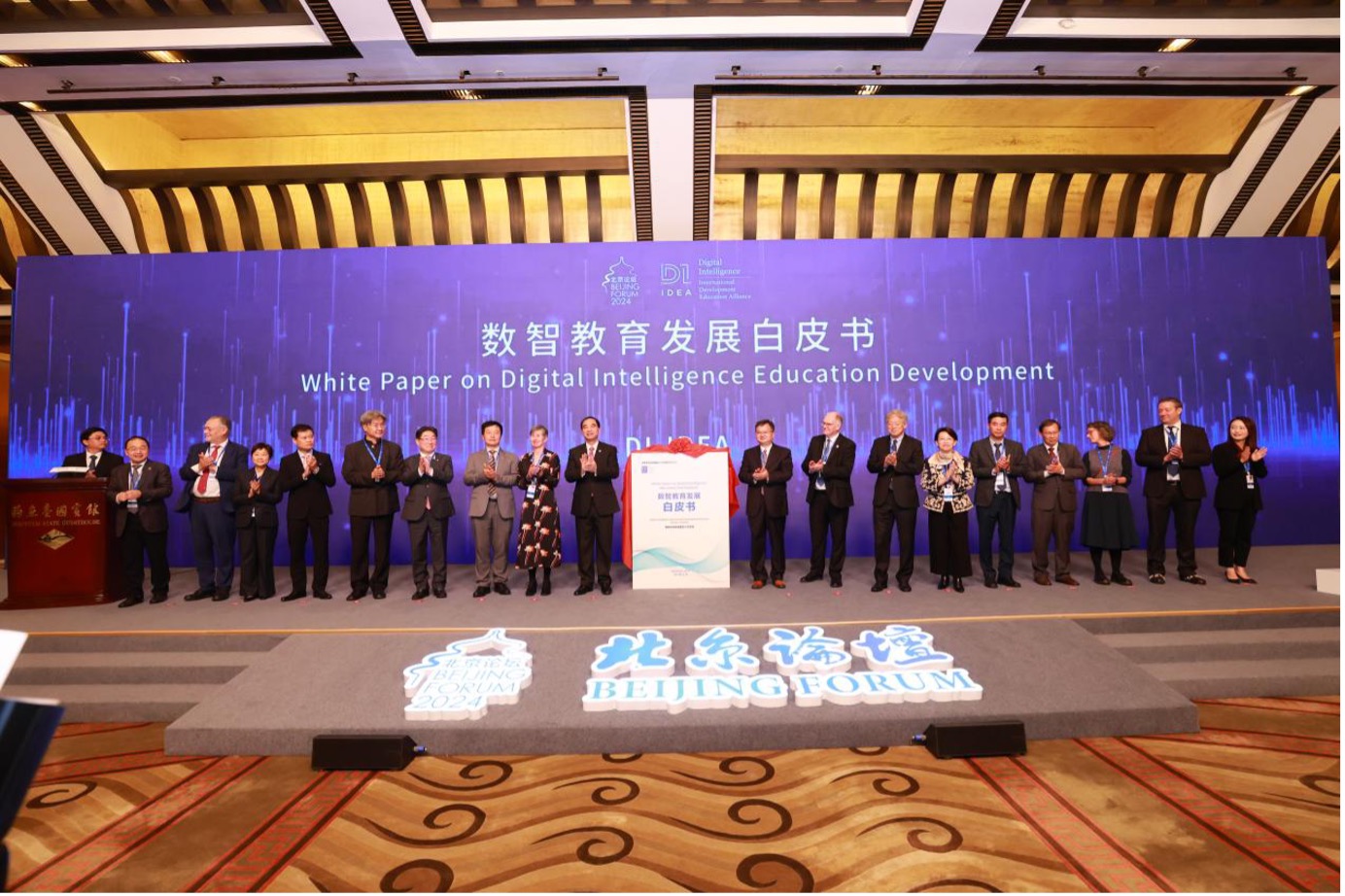
The opening ceremony was also an exciting occasion for the Digital Intelligence International Development Education Alliance (DI-IDEA), a 30+ member university consortium established at last year’s forum. This year, the alliance released the Digital Education Development White Paper which comprises over 100 case studies from more than 50 universities, showcasing best practices of the use of digital intelligence in higher education. This undertaking reaffirms the alliance's commitment to advancing global educational development and lays the groundwork for future educational cooperation and innovation.
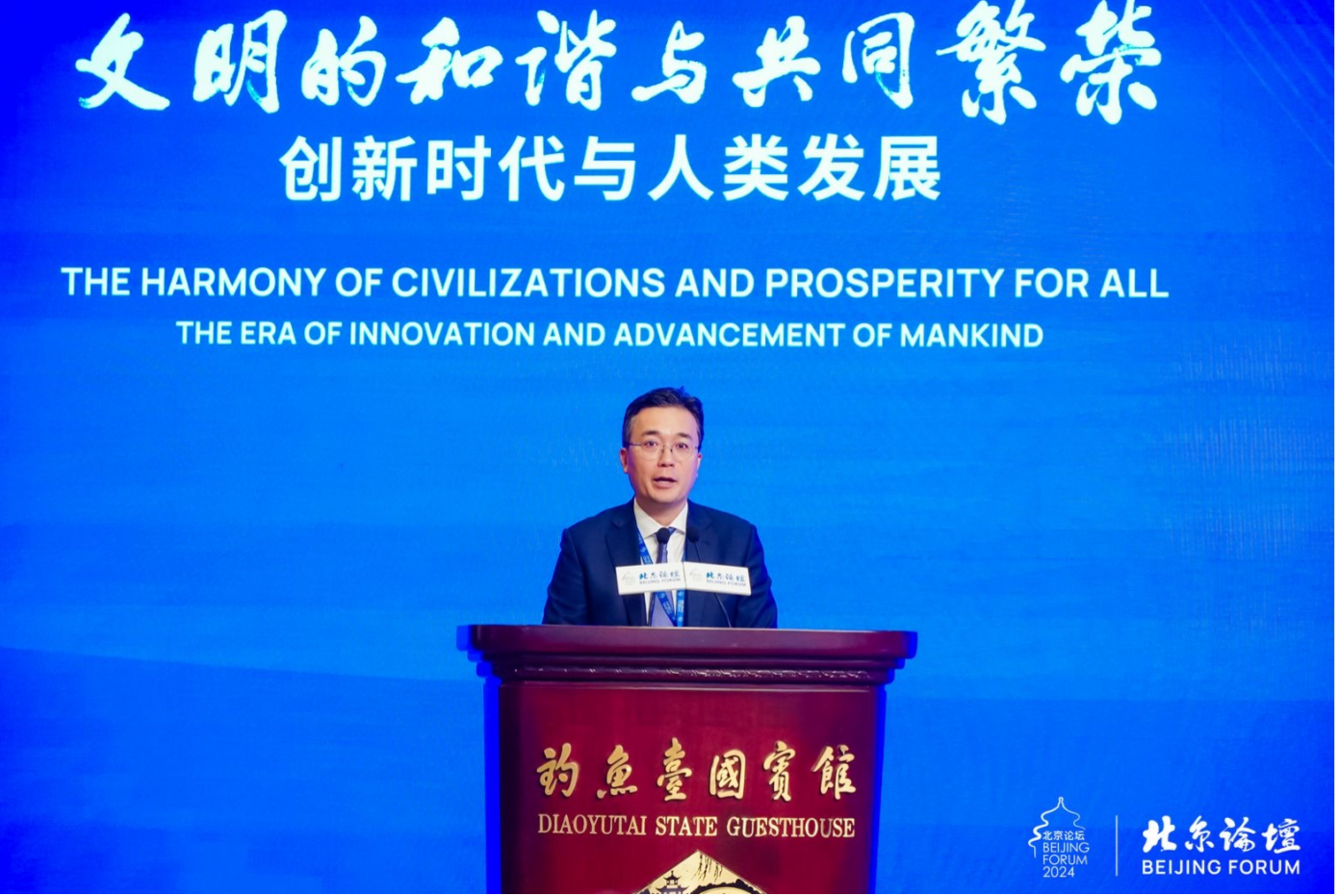
Distinguished academics from various fields were the keynote speakers at the opening ceremony, presided by Kim Yoosuk, President of the Chey Institute for Advanced Studies.
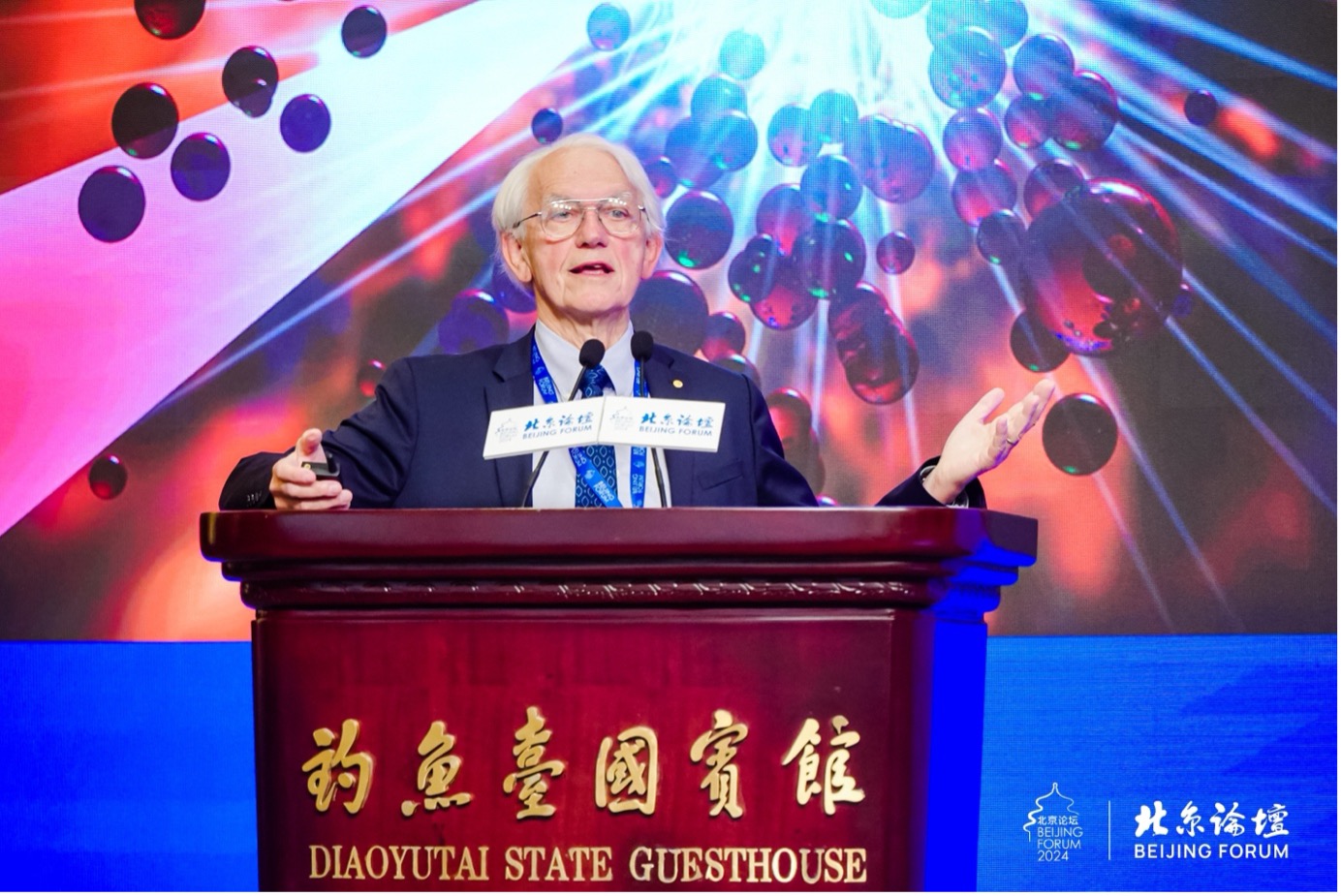
Gérard Albert Mourou, 2018 Nobel Laureate in Physics, Chair Professor at Peking University, and Foreign Member of the Chinese Academy of Sciences, delivered the first keynote address on the importance of science and innovation in addressing societal challenges.
Mourou discussed an advanced light-based technology—specifically, high-intensity lasers—as a novel approach to mitigate the escalating issue of space debris. He explained how this technology could be used to safely clear debris from Earth’s orbit, providing a sustainable solution to the risks that space debris poses to satellites and future space missions.
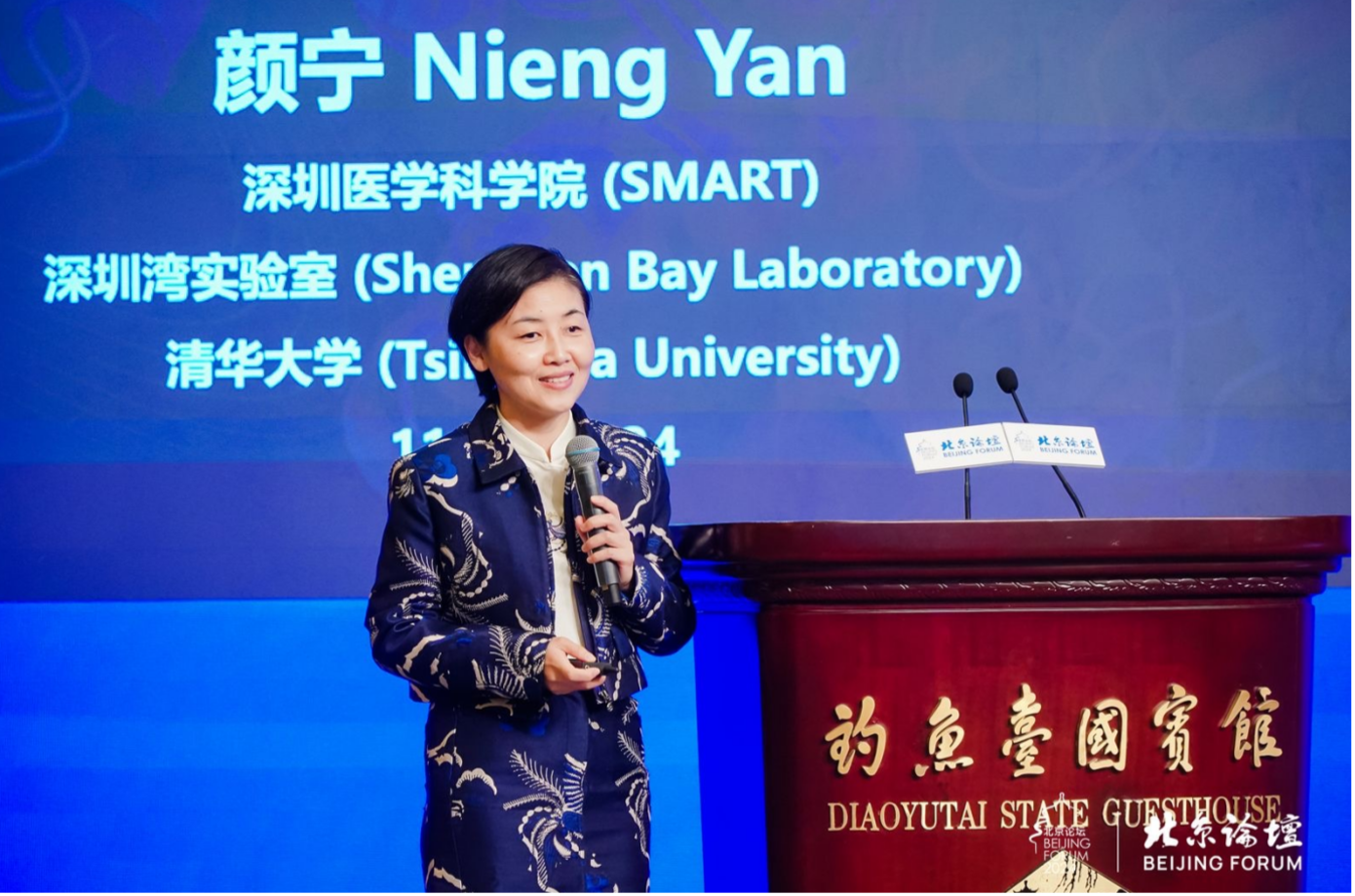
The second keynote speech was delivered by Yan Nieng. The renowned structural biologist emphasized the importance of "seeing" molecular and atomic structures that underlie biological function, demonstrating how X-ray crystallography has been instrumental in visualizing these structures. Yan explored the intricate intersections of scientific fields and how such interdisciplinary approaches are essential for advancing our understanding of life at the molecular level.
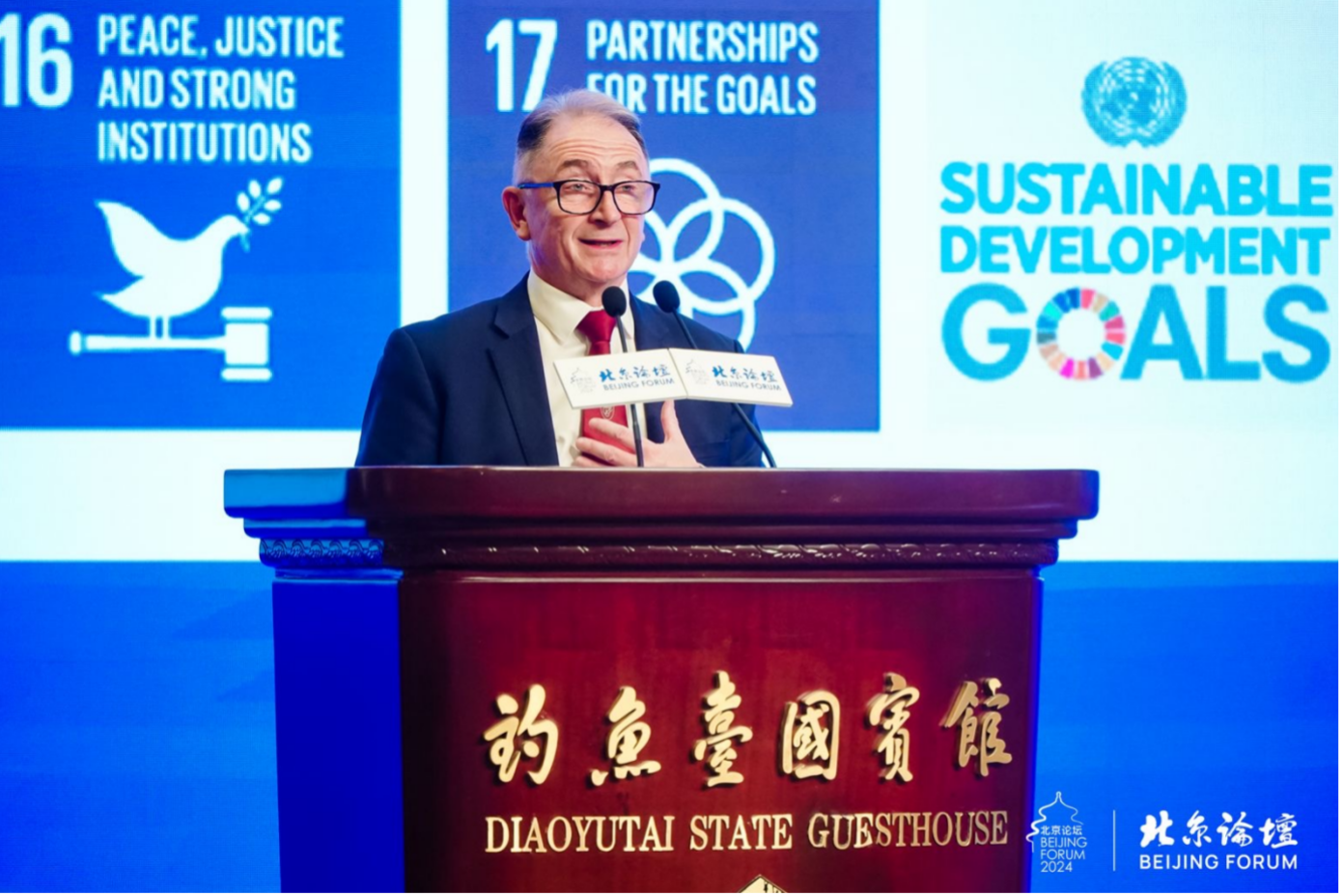
Jim McDonald GBE, delivered the third keynote where he addressed the need for a comprehensive energy strategy to achieve net-zero emissions. Professor McDonald called for a comprehensive, “whole-system” approach with coordinated efforts across sectors in order to achieve meaningful progress.
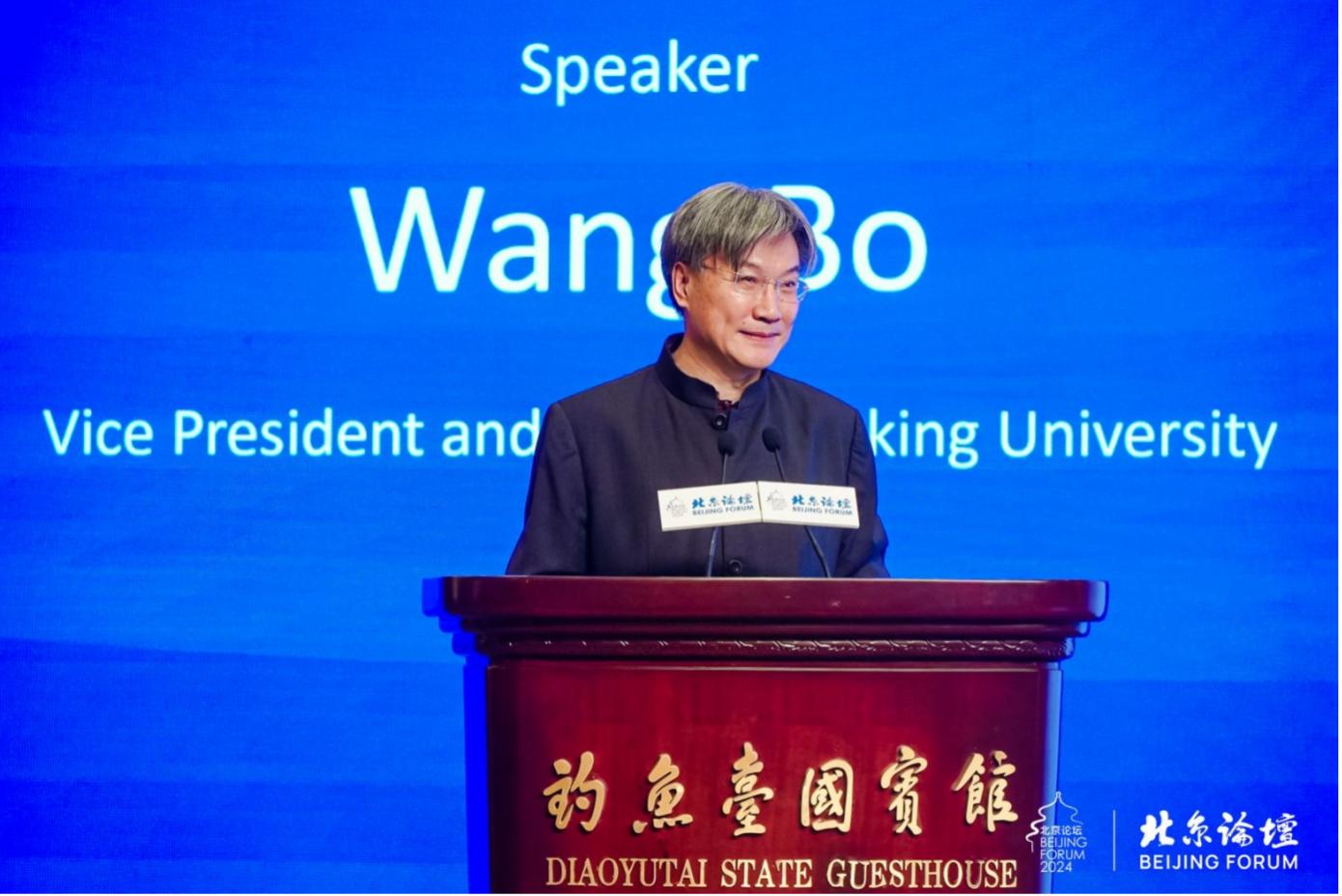
Wang Bo, Vice President and Provost of PKU, noted that while we are in an age of science and innovation with immense value, the humanities remain essential for understanding and guiding humanistic values, social order, and individual purpose. In his keynote titled “Power, Ethics and Freedom: the Value and Order of the Chinese Culture,” Professor Wang explained how the Chinese traditional value system and the concept of order offer frameworks for building ethical communities, balancing authority and order, and respecting individual autonomy.
Taking place from November 1 to 3, 2024, Beijing Forum 2024 strives to foster global dialogue with the all-encompassing principle while seeking advancement through innovation and reaching consensus through civilization.
Since its inception in 2004, Beijing Forum has hosted more than 7,000 guests from over 80 countries and regions. Under its overarching theme of The Harmony of Civilizations and Prosperity of All, the annual event draws on Beijing’s rich cultural heritage and is dedicated to advancing research on global issues and promoting academic development and social progress worldwide.
The 21st Beijing Forum, with its comprehensive scope, addresses contemporary issues and fosters mutual learning and shared progress among global civilizations. It harnesses historical momentum and promotes broad international cooperation through dialogue. Covering a wide range of topics, Beijing Forum 2024 includes 13 panels, 2 symposia, and 3 Beijing Forum Global events.
The 13 panels delve into critical areas including sustainable development, environmental health, global economic transformation, innovation as a driver of progress, the establishment of a global community with a shared future, and interdisciplinary integration in the age of artificial intelligence. The 2 symposia concentrate on the innovation of digital intelligence education and the evolution of new engineering education models. The 3 academic events under the auspicious of Beijing Forum Global, held throughout the year in collaboration with PKU’s key international partners, focus on the cultivation of future talent (WEF Summer Davos), the implications of artificial intelligence for educational development (Seoul), and research into Chinese ancient books and texts (Tokyo). Stay tuned for the extensive coverage by PKU News.
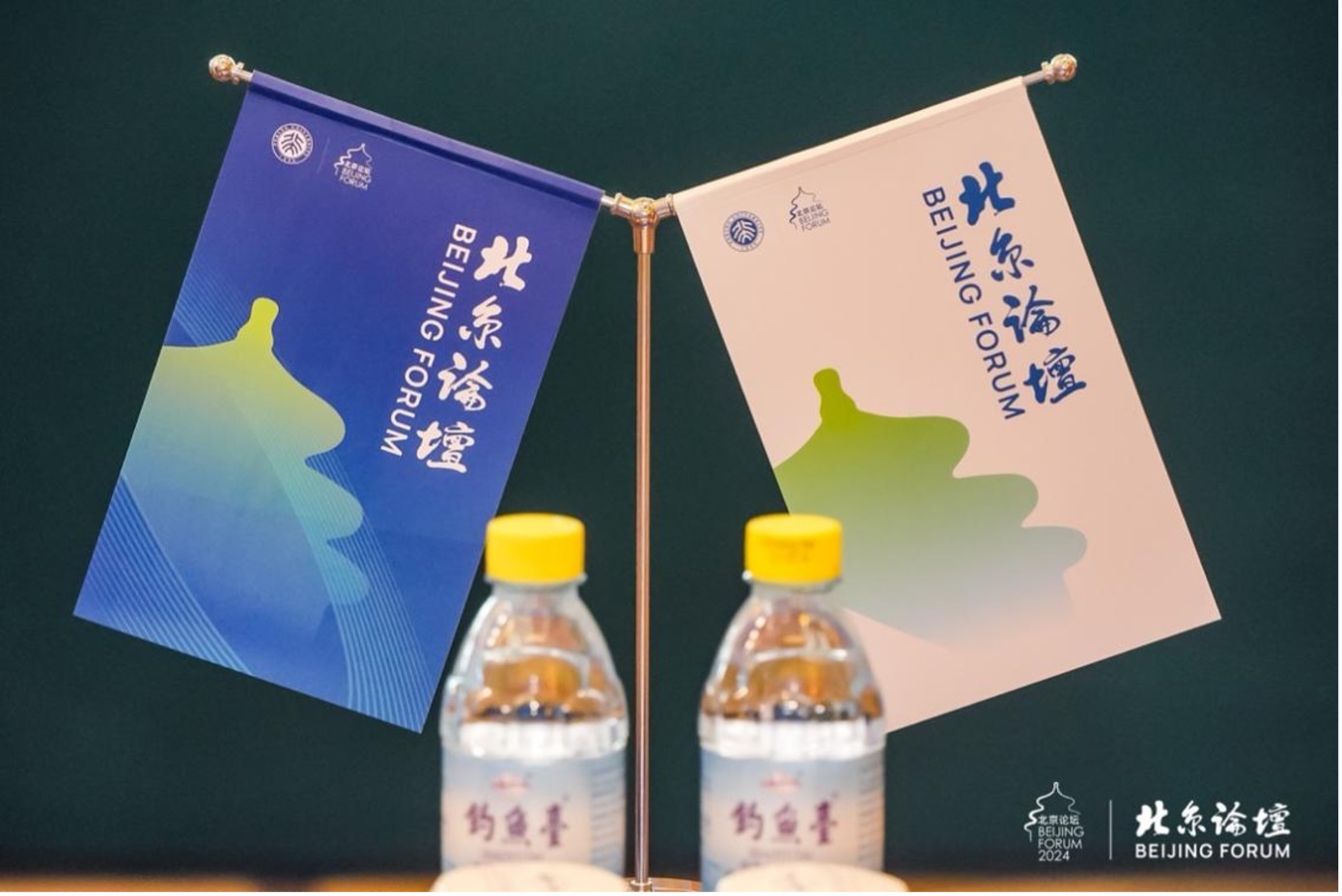
Peking University, November 4, 2024: The 21st iteration of the Beijing Forum commenced at the Diaoyutai State Guesthouse on November 1, 2024, with its overarching theme of The Harmony of Civilizations and Prosperity of All and this year’s focus on The Era of Innovation and Advancement of Mankind. Thought leaders and scholars from around the world convened to share their insights and expertise on pressing global issues and unprecedented changes brought on by the innovation era.
Yin Li, Member of the Political Bureau of the CPC Central Committee, Secretary of the CPC Beijing Municipal Committee, received the Chinese and international guests and scholars attending the opening ceremony. Zhao Lei, Member of the Standing Committee and Secretary General of Beijing Municipal Committee Yu Yingjie, Member of the Standing Committee and Secretary of the Educational Work Committee of the CPC Beijing Municipal Committee, Ma Jun, Vice Mayor of Beijing, Hao Ping, Chairman of Peking University Council, and Gong Qihuang, President of PKU, also attended the meeting.

The opening ceremony was graced by prominent global figures, including former Prime Minister of Pakistan, Shahid Khagan Abbasi, former Prime Minister of Italy, Romano Prodi, 2018 Nobel Laureate in Physics and Chair Professor at PKU, Gérard Albert Mourou, Principal and Vice-Chancellor of University of Strathclyde, Jim McDonald GBE, President of Chey Institute for Advanced Studies, Kim Yoosuk, Founding President of Shenzhen Medical Academy of Research, Yan Nieng, SK Group Chairman Chey Tae-won, and Ambassadors to China from various countries.

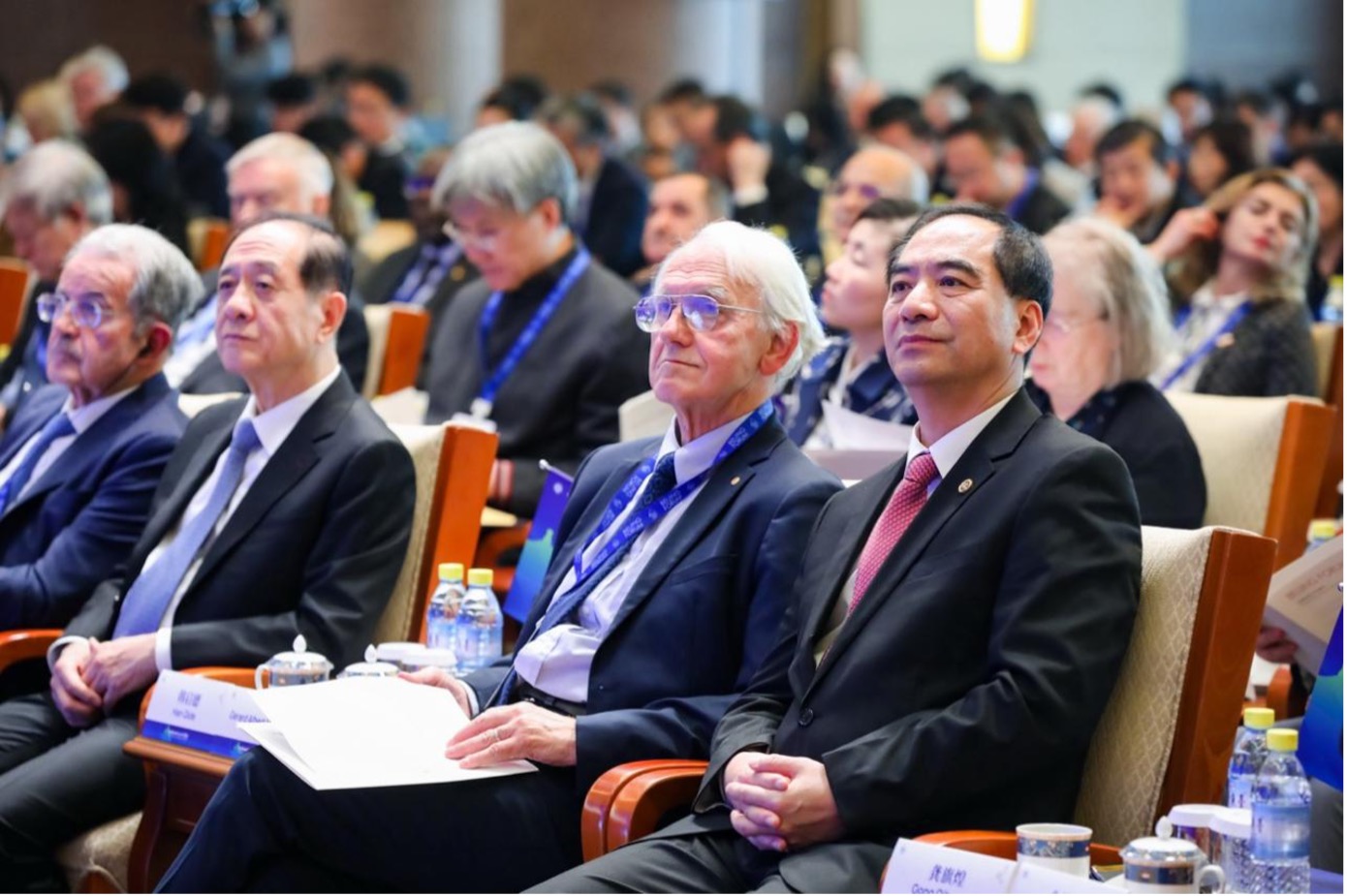
Zheng Jianbang, Vice Chairman of the 14th Standing Committee of the National People’s Congress, Academician Han Qide, Vice Chairman of the 10th and 11th National People’s Congress and Vice Chairman of the 12th National Committee of the CPPCC, Yu Yingjie, Member of the Standing Committee of the CPC Beijing Municipal Committee and Secretary of the Educational Work Committee of the CPC Beijing Municipal Committee, and other esteemed guests from fellow universities also attended the opening ceremony.
PKU President Gong Qihuang and other University leadership attended the opening ceremony which was presided over by Fang Fang, Vice President of PKU.
Zheng Jianbang at the Beijing Forum opening ceremony
Zheng Jianbang, spoke on the importance of fostering an open and inclusive environment for innovation. He zeroed in on the need to leverage scientific and technological innovation to tackle global challenges. Zheng believes that cultural exchanges, collaboration in science and technology, and diverse ideologies, will ultimately bridge civilizations and promote harmony.

Gong Qihuang, President of PKU, addresses the opening ceremony
On behalf of Peking University, Gong Qihuang extended a warm welcome to all speakers and guests. He spoke about areas that institutions of higher education could work on to ensure positive outcomes of research and innovation in this era of innovation. Apart from promoting innovation and sustainability, President Gong also highlighted the importance of global exchanges of technology and culture in order to cultivate respect and understanding amongst students.

Shahid Khagan Abbasi delivers a speech on inclusive and equitable growth in the age of AI.
Shahid Khagan Abbasi highlighted the importance of inclusive and equitable growth, through addressing shared challenges and removal of global inequities. Abbasi also recognized the inherent disruptive nature of innovation, especially Artificial Intelligence: “We must prepare today not only for the potential of AI-driven transformation, but also develop the ethical principles guiding its future.”

Romano Prodi speaks about overcoming challenges in the era of uncertainty
In his remarks, Romano Prodi highlighted the various challenges that mankind faces in this world of uncertainties, especially in terms of climate change and international relations.
Prodi believes that science has never been more divisive, and cooperation is the only way to preserve peace, especially in areas of research and technology. “With strong and increasing cooperation, (Europe) could enjoy generations of peace and prosperity.”
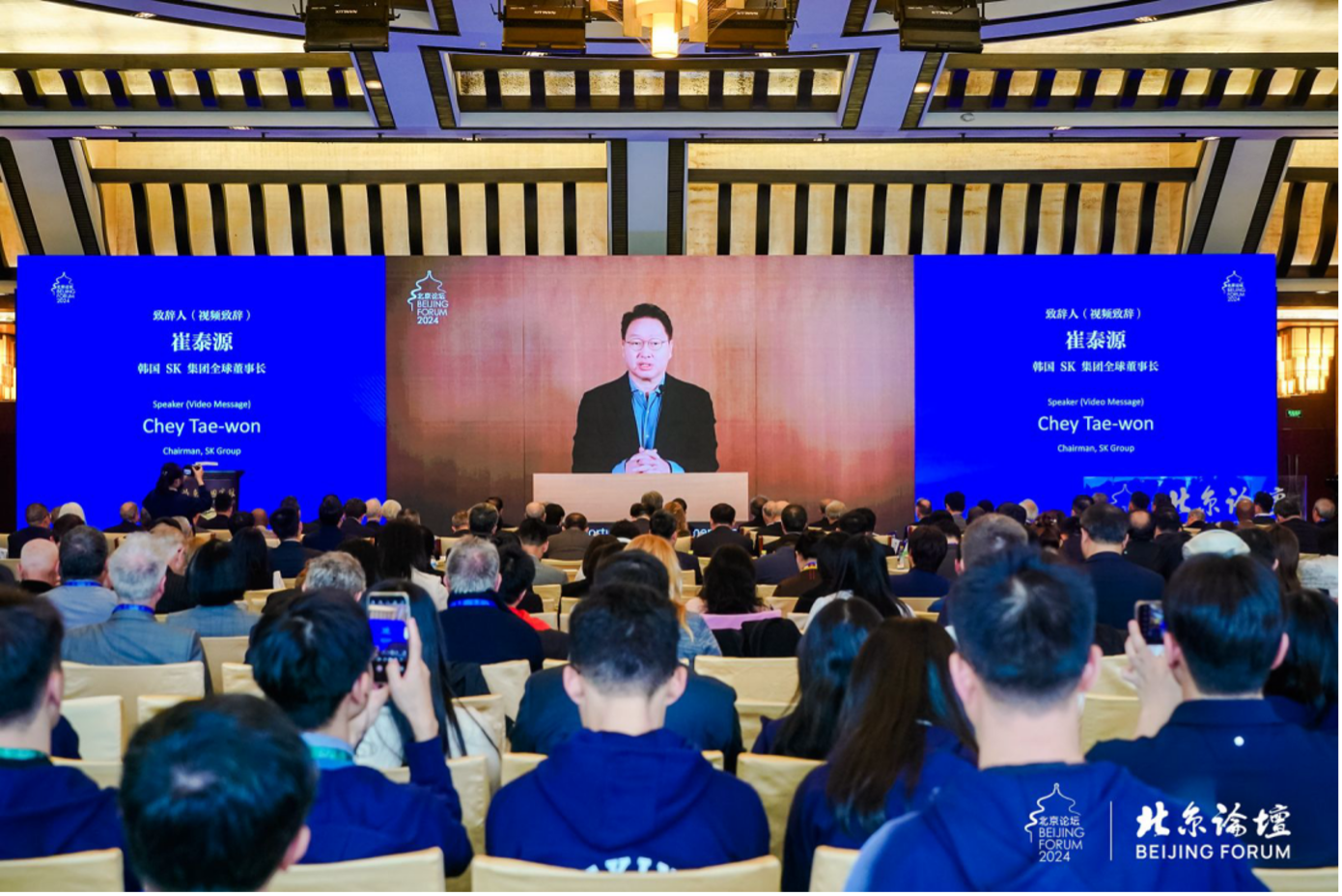

Yu Yingjie at the Beijing Forum opening ceremony
Yu Yingjie, called for collective efforts in addressing peace and development, enhancing innovation, and sharing opportunities to contribute positively to social progress and human welfare. Yu remarked, “The era is vibrant because of innovation, and civilization flourishes through exchange.”

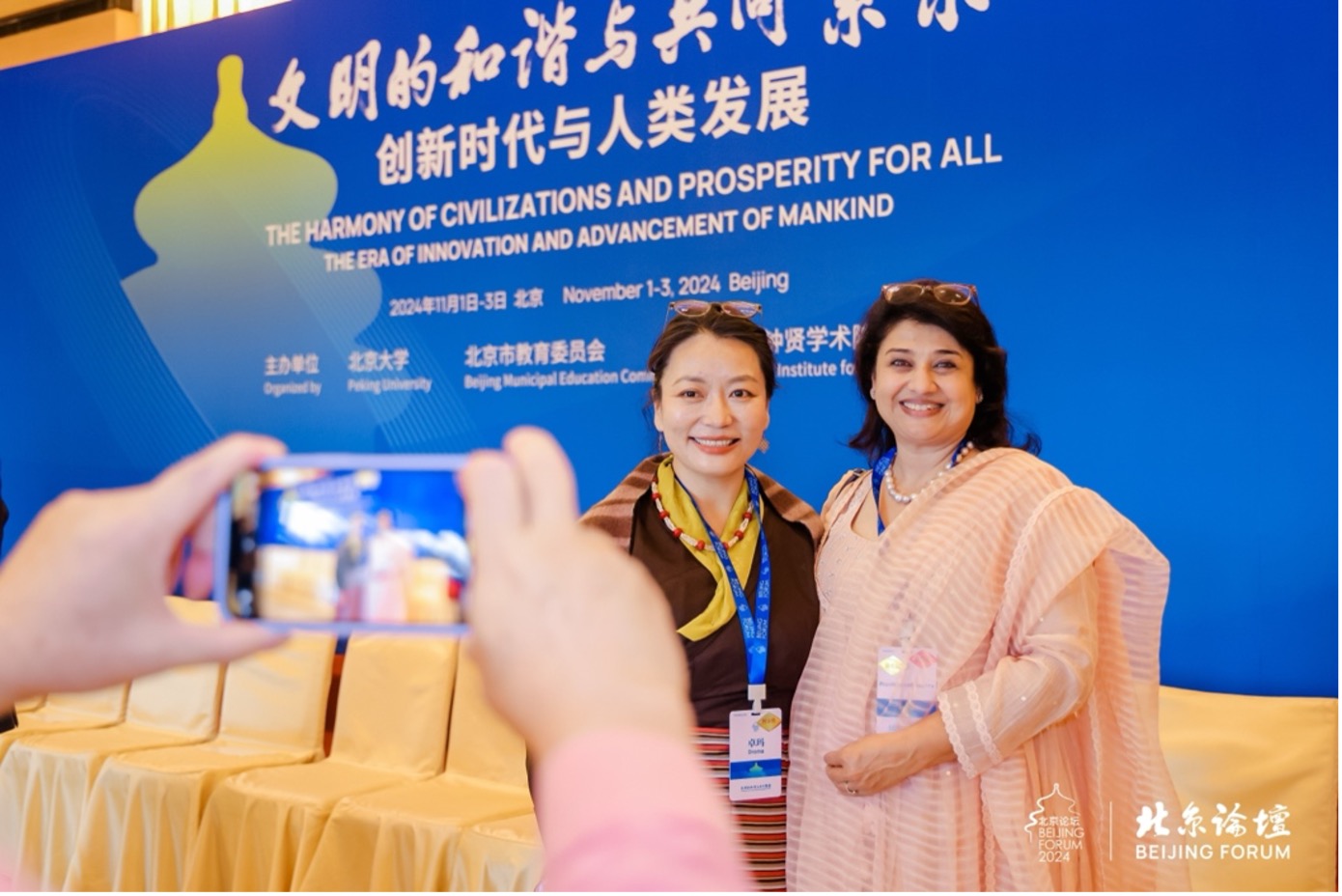

The opening ceremony was also an exciting occasion for the Digital Intelligence International Development Education Alliance (DI-IDEA), a 30+ member university consortium established at last year’s forum. This year, the alliance released the Digital Education Development White Paper which comprises over 100 case studies from more than 50 universities, showcasing best practices of the use of digital intelligence in higher education. This undertaking reaffirms the alliance's commitment to advancing global educational development and lays the groundwork for future educational cooperation and innovation.

Kim Yoosuk presides over the keynote addresses
Distinguished academics from various fields were the keynote speakers at the opening ceremony, presided by Kim Yoosuk, President of the Chey Institute for Advanced Studies.

Gérard Albert Mourou on extreme light and its role in the era of innovation
Gérard Albert Mourou, 2018 Nobel Laureate in Physics, Chair Professor at Peking University, and Foreign Member of the Chinese Academy of Sciences, delivered the first keynote address on the importance of science and innovation in addressing societal challenges.
Mourou discussed an advanced light-based technology—specifically, high-intensity lasers—as a novel approach to mitigate the escalating issue of space debris. He explained how this technology could be used to safely clear debris from Earth’s orbit, providing a sustainable solution to the risks that space debris poses to satellites and future space missions.

Yan Nieng speaks on exploring “dark matter”
The second keynote speech was delivered by Yan Nieng. The renowned structural biologist emphasized the importance of "seeing" molecular and atomic structures that underlie biological function, demonstrating how X-ray crystallography has been instrumental in visualizing these structures. Yan explored the intricate intersections of scientific fields and how such interdisciplinary approaches are essential for advancing our understanding of life at the molecular level.

Jim McDonald GBE delivers a keynote on sustainable development and technology
Jim McDonald GBE, delivered the third keynote where he addressed the need for a comprehensive energy strategy to achieve net-zero emissions. Professor McDonald called for a comprehensive, “whole-system” approach with coordinated efforts across sectors in order to achieve meaningful progress.

Wang Bo speaks about the philosophy of science and innovation
Wang Bo, Vice President and Provost of PKU, noted that while we are in an age of science and innovation with immense value, the humanities remain essential for understanding and guiding humanistic values, social order, and individual purpose. In his keynote titled “Power, Ethics and Freedom: the Value and Order of the Chinese Culture,” Professor Wang explained how the Chinese traditional value system and the concept of order offer frameworks for building ethical communities, balancing authority and order, and respecting individual autonomy.
Taking place from November 1 to 3, 2024, Beijing Forum 2024 strives to foster global dialogue with the all-encompassing principle while seeking advancement through innovation and reaching consensus through civilization.
Since its inception in 2004, Beijing Forum has hosted more than 7,000 guests from over 80 countries and regions. Under its overarching theme of The Harmony of Civilizations and Prosperity of All, the annual event draws on Beijing’s rich cultural heritage and is dedicated to advancing research on global issues and promoting academic development and social progress worldwide.
The 21st Beijing Forum, with its comprehensive scope, addresses contemporary issues and fosters mutual learning and shared progress among global civilizations. It harnesses historical momentum and promotes broad international cooperation through dialogue. Covering a wide range of topics, Beijing Forum 2024 includes 13 panels, 2 symposia, and 3 Beijing Forum Global events.
The 13 panels delve into critical areas including sustainable development, environmental health, global economic transformation, innovation as a driver of progress, the establishment of a global community with a shared future, and interdisciplinary integration in the age of artificial intelligence. The 2 symposia concentrate on the innovation of digital intelligence education and the evolution of new engineering education models. The 3 academic events under the auspicious of Beijing Forum Global, held throughout the year in collaboration with PKU’s key international partners, focus on the cultivation of future talent (WEF Summer Davos), the implications of artificial intelligence for educational development (Seoul), and research into Chinese ancient books and texts (Tokyo). Stay tuned for the extensive coverage by PKU News.

- Added: 07.11.2024
- Views: 2946
 Ўзбекча
Ўзбекча English
English Русский
Русский
